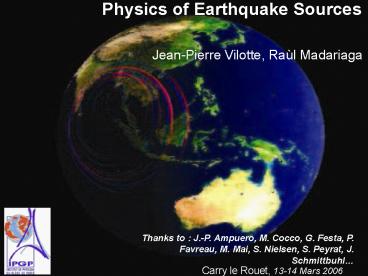Diapositive 1 - PowerPoint PPT Presentation
1 / 26
Title: Diapositive 1
1
Physics of Earthquake Sources
Jean-Pierre Vilotte, Raùl Madariaga
Thanks to J.-P. Ampuero, M. Cocco, G. Festa, P.
Favreau, M. Mai, S. Nielsen, S. Peyrat, J.
Schmittbuhl
Carry le Rouet, 13-14 Mars 2006
2
Introduction
- Microscale
- Contact interactions, potential, dissipation,
surface energy, friction, thermal flash, wear,
fluids and melting, deformation.
- Mesoscale motion
- Fault zone deformation, surface energy breakdown
and friction dissipation, fluids pressurisation,
melting, laboratory experiments, interface
constitutive laws
- Interface dynamics
- Rupture initiation, propagation and arrest,
off-interface dissipation, radiation, asperities,
energy balance, laboratory experiments
- Individual faults
- fault geometry, depth variation, crustal
heterogeneities, radiation, strong ground motion,
multiplets, inversions,
- Fault networks
- Fault interactions, seismicity, space and time
correlations, foreshocks, aftershocks, regional
hazards
3
Earthquake source dynamics Problem
The classical earthquake model fault plane with
friction
Rupture propagation model
BB Seismic waves
Macroscale
(lt 0.3 Hz lgt 5 km)
Following Kostrov
Mesoscale
Hifi Seismic waves
(gt0.5 Hz llt2 km)
Problem posed by recent observations scaling
from laboratory to natural faults (fracture
energy, stress heterogeneities)
4
The Landers case
Peyrat, Aochi, Madariaga, Olsen
Olsen, Archuleta, Matarese
5
Earthquake source dynamics problem
What controls the dynamical properties of the
earthquake rupture ?
- Mechanical Behaviour of the fault interface
- damage and fracture, surface energy and friction,
fluids, melting,
- Inhomogeneity of the fault interface
- Initial stress and material properties (scale ?)
, non planar geometry,
- Large scale geometry features
- depth variation, planar and non planar
segmentations, fault network properties,
6
Laboratory studies of friction
T. Hirose, T. Shinamoto, G. Di Toro, S. Nielsen
- At seismic slip rates, strong rate weakening and
small normal stress dependence melt lubrication - Dc decreases with increasing normal stress
- Dc of the same order than seismological studies
Hirose 2005, personal comm.
7
Fault zone dissipation
- Beyond the classical model
- frictional heating and melt lubrication
- thermal pressurization of fluids
- dilatancy of fault gouge
- off-fault dissipation by rock damage
Wilson et al. (Nature, 2005), Reches and Dewers
(EPSL, 2005)
Measured grain size distribution multiple
fracture branches ?surface energy 2-10 MJ/m2
8
Interface dissipation
Es DU - Gc /- K
Inelastic process zone
Dc
D
Event dependant
Gc G(vr, L, Dt) g(vr)
Gstatic(L,Dt) g(vr) Dt2 L /2m
Seismological estimate of the breakdown work
for the Landers earthquake and pulse-like scaling
(Tinti, Spudich and Cocco, JGR 2005)
9
Back to earthquakes
How do assumptions about dissipation effect
interpretations of seismic events
Rupture dynamics Radiation Heat anomaly
10
Nucleation Phase ?
Campillo, Ionescu, Favreau, Voisin, Ampuero,
Vilotte, Rice, Uenishi
11
Supershear Rupture
12
Supershear Rupture
Festa and Vilotte (2006), Dunham and Archuleta
(2005)
13
Fault geometry and Hifi radiation
Two attempts to model the Izmit Earthquake
The rough fault models produces subshear
ruptures
Aochi, Fuyama, Madariaga, 2003
14
Hifi at mesoscale
Festa, Vilotte, Madariaga, Ampero (2006)
15
Asperity and supershear
Dunham, Favreau and Carlson
16
Subduction and rupture
Dragert et al, 2001
Liu and Rice, 2005
Hirn and Laigle, 2005
17
Uncertainty and stochastic models
Ampuero, Mai et al.
18
Uncertainty in earthquake modelling
Initial parameters determined by low frequency
inversion of recorded ground motion. Uncertainty
allow different representation of the rupture.
Including the uncertainty in the physical
process, which governed the radiated elastic
waves, has not been solved.
19
Kinematic Inversion
Example Landers (1992)
20
Kinematic models
21
Kinematic inversion scaling laws
Guatteri et al. (2004), Mai et al.
Maximum Gc
Average Gc
Gc a b Ds Lc1/2 Mw lt 6.5 a 0.18, b
0.0015 Mw ? 6.5 a 0.27, b 0.0021
22
Source Inversion
Kinematics Are inversions realistic? -gt Dont
ask! (sic Raùl) Are they stable? -gt
Blind Test (SPICE) Often only one model is
given ! Which part of the results is best
constrained? Why do different inversions have
such different slip models?
Dynamics How do we set up kinematic inversions
that are compatible with
dynamics ?
Both How to extend the inversions
beyond 0.3 Hz, so that they are useful in
engineering ? How to
interface with GPS, interferometry and geology?
23
Integrated studies
24
Laboratory studies of friction
Ohnaka et al.
J. Finberg et al.
J. Schmittbuhl et al.
25
Supershear detection
Spudich et al., 2005
26
Spudich et al., 2005































